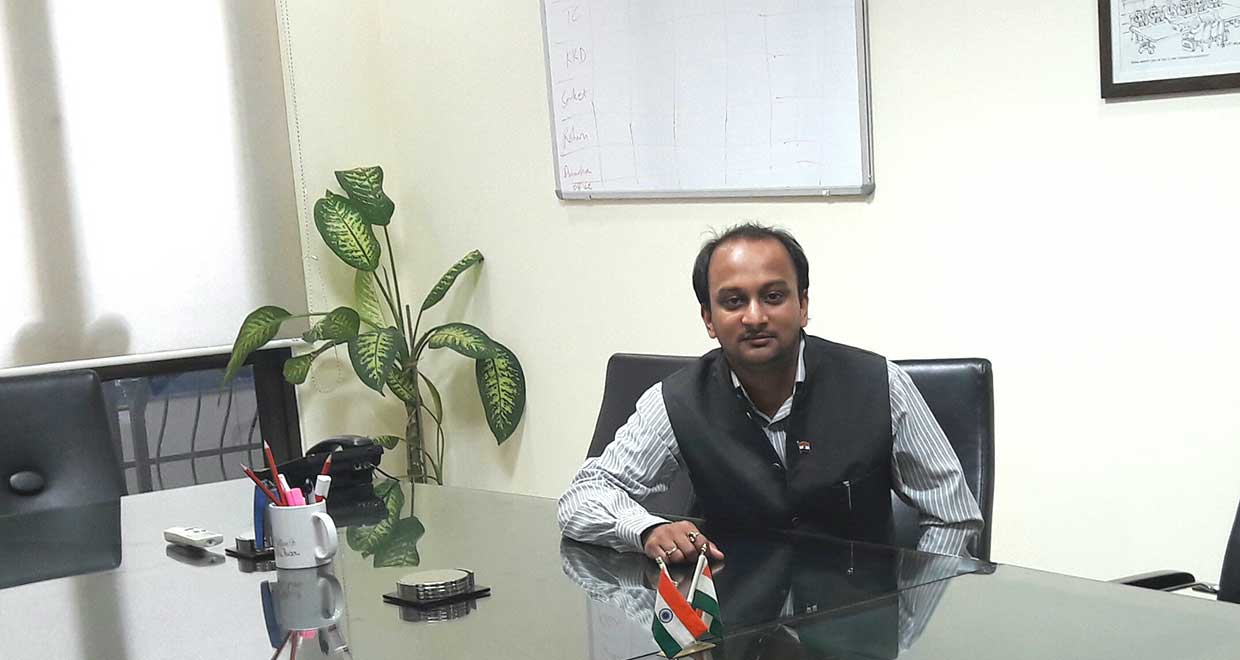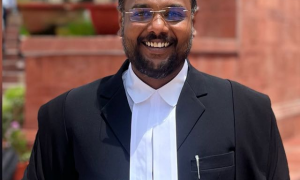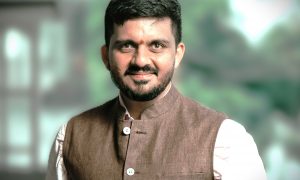Aayush Chandra graduated from Symbiosis Law School (2006-2011). At present he is a Senior Associate at AMP Solicitors. His main work includes drafting, briefing, court appearances and research in Civil and Corporate Laws.
In this interview he talks to us about:
- His experience at Symbiosis Law School.
- Role of mooting in a law student’s life.
- Skills those are critical for a lawyer’s success.
- How he overcame the initial jitters in a court room full of experienced lawyers and judges.
Please share with us how you chose to study law. Do you have lawyers in your family?
Coming from a family of Engineers and Doctors, I had to choose a Profession. Being an Engineer or a Doctor was not an option as I hated Mathematics and I could not stand an operation theatre. I remember my father, being an Engineer himself having advised me not to study Engineering as it had become quite common those days. So, I was without a choice frankly and I didn’t mind that (laughs). Then eventually the dots connected, everything fell into place and I became a lawyer by default. Being five years into the profession and still a long-long way to go both in terms of learning and experience, I can safely say that this field chose me rather than me having made a conscious decision.
My Sister in law and my Cousin Sister are corporate lawyers and are doing very well. I am a first generation lawyer.
Also, some of the lawyers who have had a major impact in my life are also like my extended family. A special mention for Ms. Pinky Anand, Mr. Sanjeev Sahay, Mr. Balendu Shekhar, Mr. Ashish Kumar, Mr. L.K. Singh, Mr. Rakesh Kumar Matwa and Mr. Jatin Sehgal- I owe all of them a lot.
How was your experience at Symbiosis Law School?
I think those five years taught me to be disciplined, to be self sufficient, to be responsible and to survive. It basically changed me from a lazy person to a street smart person. Symbiosis was good in the manner that I suddenly went from a zoo animal to a jungle animal and I could survive. The faculty was amazing; the friends were amazing and the over-all environment was great. Made some of my best friends in college, the most admired one being Jayant Dahiya.
What role do you think mooting should play in a law student’s life?
A very important one!! Since I wanted to step into Court practice, mooting was an important way to be able to learn to talk precise and talk sense before a Judge. Mooting is a very important curriculum that every law student should participate in as it teaches you to research, to be brief and concise in your arguments apart from learning how to address a Court. Actual Court practice is all about having good research skills, good legal interpretation to the facts at hand and then effectively putting this combined skill in a very articulate and humble manner before the Court.
Is there any habit or skills you picked up over the years that you believe is critical to a lawyer’s success?
Reading your laws, updating yourself on the latest position of law, not restricting yourself to any particular field and the hunger to learn are all part of the homework.
As far as the class work or effectively putting it before a Court is concerned, I believe a lawyer should be presentable and concise to the Court hearing. One should be calm, no personal remarks against the opposite counsel, certainly no dramatics in Court and the most important skill would be to listen, listen carefully to what the judge puts to you and then answer it precisely rather than beating around the bush. That is where your Court craft comes to the fore.
A lot of young lawyers get excited and make statements without instructions or without being sure about the factual or legal position, which as per my opinion should be avoided as then the bench doesn’t take you seriously.
A lawyer being an officer of the Court has the duty and the responsibility to be fair to the Court and not conceal an important fact or document even if it goes against your client. It is also important to be able to draw a line between how a client sees the brief or a particular situation and how you as a lawyer, an expert in the field see it. The idea is to be a lawyer whose word can be trusted, respected and affirmed rather than being a mouthpiece of the client.
What perception of the law and the legal system did you have before going in for an LL.B. and how did the same change through and after your graduation?
Coming from Allahabad which has a beautiful High Court and having been family friends with some renowned lawyers, to my perception the legal world was and has been full of power, aura and respect. The ability to see a situation from both the sides and the necessary duty to carry the burden of justice on your shoulders are very difficult virtues to stand to.
I have in my small time here tried to do just that and I sincerely hope that I keep doing that till the time I practice. I have been in effective Court practice since 2011 and luckily for me my life has thrown me into all kinds of storms. So I have appeared from the Tehsildar Court right upto the Supreme Court in different matters.
My legal aid assignment has taught me the most. It cleared my basics in criminal law; it taught me how to deal with a client independently and how to handle a matter independently. It taught me how to apply my brains to a legal situation and how to win the day. It taught me why the seniors have a good reason to shout on their juniors if the matter is not prepared minutely and effectively.
Since my practice has been mostly of District Courts of Delhi and the Delhi High Court, I would like to appreciate the quality of Judges we have in these Courts. They are always well versed with the files and the legal position. They are patient listeners totally calm and composed and the most motivating factor is that they promote young talent. It is a very enriching experience to appear in these Courts and every single day, a lawyer learns from it.
What is your workday like? Are there new challenges every day or did work fall into a predictable pattern?
Once you’re into Court practice, everyday is a new day and an exciting one and more so for me as I am on the Panel of the Legal Aid Scheme (Criminal). I wish my practice and my day never becomes predictable, I would hate it. On a working day, I am working from 9:30 am to 7:30 pm which includes Court appearances, conferences on a daily routine. This timeline is certainly extendable till 9 if a client has some urgency. The vacation days and extended weekends are a much needed part of our profession.
If someone does not go to a top law school, would you say he still has a shot at a great career in law?
Off course, in the end what wins the day is how much of hard work are you willing to put in to a brief. This career demands a lot of attention, a lot of perseverance and infinite amount of patience. Then slowly you start meeting your clients. This is not where it ends. What distinguishes a great lawyer from a good lawyer is how he conducts himself with his peers, with his juniors, with his clients and in the Court. The most important thing is not to lose your ethics and the trust, standard and proficiency that are expected out of a lawyer and then to be consistent day in and day out.
How did you overcome the initial jitters in a court room full of experienced lawyers and judges?
Mooting played an important role. But trust me nothing prepares you for your first appearance than the appearance itself. The second appearance becomes the most important then. Luckily for me, I had the full support of my senior in my first appearance, so I felt assured and it went well. The Ld. Judge at the first impression knew a young entrant is appearing and looks nervous and therefore he was very patient. As a fond memory I still have my 500 Rupee note framed with me which I received as my first appearance.
Many students aspire to practice at the Supreme Court and High Courts. Should a student first practice at the trial court to learn the nuances, or is it fine to start at a High Court itself?
I think the initial two years should be mandatorily in a District Court. It teaches you much more than what you will learn in 5 years in a Senior Advocate’s office. I think you should try to be a cook first before you can call yourself a Chef. You should keep your head down and learn the procedures in the District Court before you can call yourself a decent lawyer who will be able to handle a briefing and effectively brief a senior. This should be the primary aim, to equip your-self with the procedure and to learn to handle or brief a matter both as a whole or hearing wise. High Court practice is also necessary before moving towards the Supreme Court in the later years as it gives you a lot of perspective. It takes your practice to a more refined and polished level.
Do you have any parting advice for all our readers out there?
Yes, don’t be disheartened if this profession especially litigation doesn’t pay you at the start. No profession does. You have to gradually keep learning and build yourself up to a level and eventually it will all fall into place. Your struggling days and how you react to them will shape you as an individual both professionally and personally. Respect the struggle because it is teaching you.
Once you hit the headlines for all the right reasons and have a BMW in front of your door, all this struggle and hard work will be worth it.
But the BMW glamour and the jet setting lifestyle should only be an occupational privilege, don’t make it the only standard for this profession. For our profession is a very noble one. You all have the power and the education to actually assist in imparting justice and that should be the foremost aim. Rest all follows. And trust me this profession demands very big shoes to be filled in, out of which the foremost and the most important ones are ethics, temperament and knowledge.
To end it, I personally feel that every lawyer should try to help lawyers younger to them and shape them as good leaders and human beings so that the rich and noble legacy of this profession continues.


























